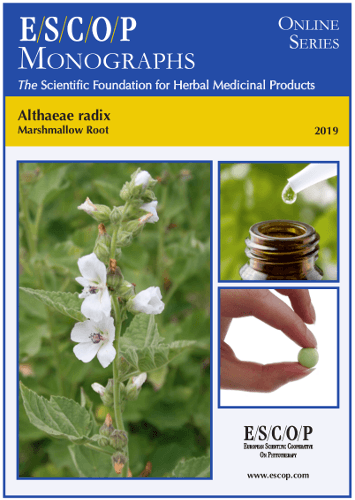 Althaeae radix
Althaeae radix
Marshmallow root
Althaea officinalis L.
Published 2019
Format: PDF
 Online viewing (for only €30 per year, you can view online all the monographs)
Online viewing (for only €30 per year, you can view online all the monographs)
Summary
The herbal monograph selects and summarizes scientific studies and textbooks regarding efficacy, dosage and safety to support the therapeutic uses of marshmallow root.
This herbal drug by definition consists of the peeled or unpeeled, whole or cut, dried root of Althaea officinalis L.
Studies with its main characteristic constituents the mucilage polysaccharides, such as rhamnogalacturonans, arabinans, glucans and arabinogalactans are included.
The therapeutic indications are dry cough, irritation of the oral or pharyngeal mucosa and for symptomatic relief of mild gastrointestinal discomfort and irritation of the gastric mucosa. Administration of marshmallow root addresses posology; its duration of use; contra-indications; special warnings; special precautions for use; interactions with other medicinal products; other forms of interaction; in pregnancy and lactation; its effects on ability to drive; undesirable effects; overdose.
In vitro experiments with marshmallow root mucilage or its extracts demonstrated antibacterial, mucilage protective and antioxidant properties.
In vivo experiments with isolated root mucilage polysaccharides or marshmallow root extracts demonstrated antitussive, anti-inflammatory, hypoglycaemic and an increase of macrophage phagocytic activity.
Controlled clinical studies with marshmallow root extract demonstrated its use as an antitussive in adults and reduced cough intensity as well as cough frequency in children with cough.
Clinical safety data were assessed in human studies. Two adverse events were not attributed to marshmallow root and tolerability was reported as very good.
The selection of literature cited in the monograph is aimed at bringing together relevant information about the possible physiological roles of marshmallow root and its major constituents.
Keywords
- Althaeae radix
- Marshmallow root
- Althaea officinalis L.
- Dry cough
- Irritation of oral and pharyngeal mucosa
- Irritation of gastric mucosa
- Gastrointestinal discomfort